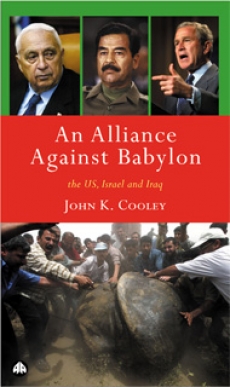| Foreword
John K. Cooley is a newspaperman’s newspaperman. He is the sort of person newcomers always seek out when they arrive for the first time in the Middle East to cover some major story. He has been there, seen that, knows who did what to whom, when, and how. And he has been doing these things since the 1950s. His 40-plus years in the Middle East and North Africa is almost unique among American journalists. And he has dealt with issues, in dispatches and broadcasts without number, and in acclaimed books from Morocco to Afghanistan. The range of his books is quite remarkable and each one singled out a major topic for treatment.
He began with Baal, Christ and Mohammed: Religion and Revolution in North Africa. His eye moved south to recount the rise of Chinese influence in Black Africa in East Wind Over Africa: Red China’s African Offensive. In Green March, Black September: The Story of the Palestinian Arabs he came to grips with the history, culture, and plight of the Palestinian Arabs and explained why they felt they had to turn to “the weapon of the weak,” terrorism. Back to the Mediterranean and Africa, he sought to comprehend the most enigmatic of all the Middle Eastern leaders, Muammar Qaddafi, in Libyan Sandstorm: The Complete Account of Qaddafi’s Revolution.
Dealing with terrorism took him to the Afghan story, the fight of that colorful mountain people against the Russians, then against themselves and finally against the Americans. Their involvement with guerrilla warfare, heavily subsidized by the United States as a part of its strategy during the Cold War, led the Islamic militants among them to associate themselves with Osama bin Laden. This is the subject of Mr. Cooley’s Unholy Wars: Afghanistan, America and International Terrorism, now in three editions and eight languages. The final edition is a revision published after the 9/11 terrorist attacks on the United States.
Publishing the results of his intensive (and often intrusive) research has not always been easy. One of his most fascinating accounts, a study of the international market in counterfeit American hundred dollar bills and a history of currency counterfeiting as a political weapon since ancient times seems to have been too sensitive for the public to read. Mr. Cooley never let such issues guide his reporting: he went “where the story was,” and reported it as fairly and intelligently as he knew how.
I first met Mr. Cooley when he became a fellow of the Council on Foreign Relations in 1964–65. He had just returned to his native New York from a hitch in North Africa, where he wrote his book on why Christianity failed there and was superseded by Islam because Christianity was seen as associated with European colonialism. He and I both participated in one of the Council’s study groups to which he was introduced as a sort of “pioneer” for what became the prestigious Edward R. Murrow foreign correspondent fellowships. I had recently left the government where I had been in charge of planning American policy in the Middle East and I had spent a troubling period as head of the “task force” on the Algerian war of national independence so I found his observations of particular interest.
I was then deeply involved with establishing the Middle Eastern Studies Center at the University of Chicago and creating the Adlai Stevenson Institute of International Affairs, I did not see him again for several years. Meanwhile, he had begun the study that would take him deep into the Palestinian uprising and on to Libyan affairs. But our paths again crossed in Lebanon where he was the Middle East correspondent for the Christian Science Monitor. Again we parted, he to become an ABC News correspondent out of London and I to live in Egypt. We met again over in Iraq where in 1987, we met a number of Ba’ath party officials and got an early view of the events he describes in this book.
This account of the tragic events and historical background of the Iraq war is his latest foray into the psychological and political minefield of the Middle East. There is much to be learned in it. Even more, to be savored and reflected upon. As will immediately become evident, it is a close-up view, derived from personal observation, lengthy interviews and much wise reflection. I hope it finds a wide audience.
William R. Polk | 